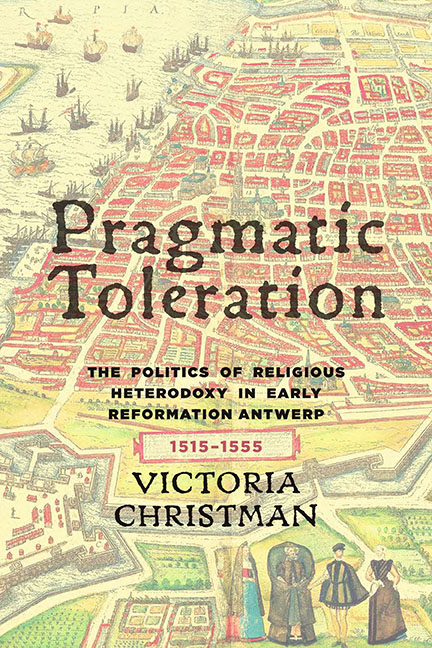Book contents
- Frontmatter
- Dedication
- Epigraph
- Contents
- Acknowledgments
- Introduction
- 1 The Lay of the Land: Government and Law in Brabant
- 2 Undercover: The Claes vander Elst Conventicle
- 3 Pragmatic Intolerance: Antwerp's Anabaptists
- 4 People of the Book: Heterodox Printers and Publishers in Antwerp
- 5 Between Stage and Scaffold: Rederijker Trials in Antwerp
- 6 Trade in Tolerance: The Portuguese New Christians in Antwerp, 1526–50
- Conclusion: Rulers and Religious Renegades
- Appendix 1 Chronology of Antiheresy Legislation in Brabant
- Appendix 2 Answers at Ghent
- Abbreviations
- Notes
- Bibliography
- Index
4 - People of the Book: Heterodox Printers and Publishers in Antwerp
Published online by Cambridge University Press: 15 March 2018
- Frontmatter
- Dedication
- Epigraph
- Contents
- Acknowledgments
- Introduction
- 1 The Lay of the Land: Government and Law in Brabant
- 2 Undercover: The Claes vander Elst Conventicle
- 3 Pragmatic Intolerance: Antwerp's Anabaptists
- 4 People of the Book: Heterodox Printers and Publishers in Antwerp
- 5 Between Stage and Scaffold: Rederijker Trials in Antwerp
- 6 Trade in Tolerance: The Portuguese New Christians in Antwerp, 1526–50
- Conclusion: Rulers and Religious Renegades
- Appendix 1 Chronology of Antiheresy Legislation in Brabant
- Appendix 2 Answers at Ghent
- Abbreviations
- Notes
- Bibliography
- Index
Summary
Unlike the pedestrian Anabaptists, Antwerp's bookmen and bookwomen were some of the wealthiest and most influential of the city's sixteenth-century residents, and among those most favored by the municipal officials as a result. The city was a world-renowned publishing center in this period, known for the great wealth generated by that industry, and for the scores of heterodox works that emanated from its presses, many of which were then transported via trade routes throughout Europe and beyond. Already in September 1520, the papal legate Jerome Aleander arrived in Brabant to investigate rumors of heresy. A few months later, he traveled to Ghent and Bruges, where he proclaimed Luther's excommunication in the bull Exurge Domine and oversaw the burning of Lutheran books.
There was much work for him to do. By 1521, Luther's writings were circulating widely in the Low Countries and would continue to do so despite the best efforts of Aleander and his clerical colleagues. Indeed, in the years 1523 to 1540, twenty-eight whole or partial translations of the Bible were printed in the Dutch vernacular, in direct contravention of the emperor's edicts. Antwerp in particular became an active center of unorthodox printing, and many of the individuals tried for crimes involving heretical books (including possession, sale, and printing of such works) were based in the city. Yet, despite the clear contravention of the imperial edicts that occurred daily in the publishing sector, very few offenders were punished, and even fewer of those to the full extent of the law. The printers and publishers of Antwerp therefore provide an excellent case study to illustrate the selective toleration exercised by the city's rulers.
Antwerp as a Center of Heterodox Publishing
Antwerp had a long history as a highly successful printing center. By the end of the fifteenth century, the city was responsible for the majority of the book production in the southern Low Countries, producing an annual total of over 400 titles, in comparison to the 130 or so produced by all other southern towns combined. Printing required capital, especially for the purchase of paper, which was extremely expensive.
- Type
- Chapter
- Information
- Pragmatic TolerationThe Politics of Religious Heterodoxy in Early Reformation Antwerp, 1515–1555, pp. 69 - 86Publisher: Boydell & BrewerPrint publication year: 2015

